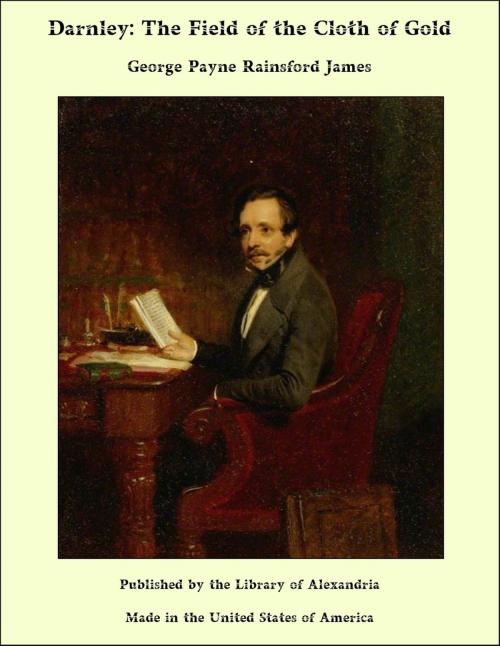Darnley: The Field of the Cloth of Gold
Nonfiction, Religion & Spirituality, New Age, History, Fiction & Literature| Author: | George Payne Rainsford James | ISBN: | 9781465605566 |
| Publisher: | Library of Alexandria | Publication: | March 8, 2015 |
| Imprint: | Language: | English |
| Author: | George Payne Rainsford James |
| ISBN: | 9781465605566 |
| Publisher: | Library of Alexandria |
| Publication: | March 8, 2015 |
| Imprint: | |
| Language: | English |
On the morning of the 24th day of March, 1520, a traveller was seen riding in the small, rugged cross-road which, traversing the eastern part of Kent, formed the immediate communication between Wye and Canterbury. Far be it from me to insinuate that this road pursued anything like a direct course from the one place to the other: on the contrary, it seemed, like a serpent, to get on only by twisting; and yet truly, as its track now lies pictured on the old county map before me, I can discover no possible reason for its various contortions, inasmuch as they avoid neither ascents nor descents, but proceed alike over rough and smooth, hill and dale, appearing only to wind about for the sake of variety. I can conceive the engineer who planned it laughing in his sleeve at the consummate meanderings which he compelled his travellers to undergo. However, as at the time I speak of this was the only road through that part of the country, every traveller was obliged to content himself with it, such as it was, notwithstanding both its circumvolutions and its ruggedness. Indeed, the horseman and his beast, who on the afore-mentioned morning journeyed on together towards Canterbury, were apparently well calculated to encounter what the profane vulgar call the ups and downs of life; for never a stouter cavalier mounted horse, and never a stouter horse was mounted by cavalier; and there was something in the strong, quadrate form of each, in the bold, free movement of every limb, and in the firm, martial regularity of their pace, which spoke a habitual consciousness of tried and unfailing power. The rider was a man of about five or six-and-twenty, perhaps not so old; but the hardy exposed life which had dyed his florid cheek with a tinge of deep brown, had given also to his figure that look of set, mature strength which is not usually concomitant with youth. But strength with him had nothing of ungracefulness, for the very vigour of his limbs gave them ease of motion. Yet there was something more in his aspect and in his carriage than can rightly be attributed to the grace induced by habits of martial exercise, or to the dignity derived from consciousness of skill or valour: there was that sort of innate nobility of look which we are often weakly inclined to combine in our minds with nobility of station, and that peculiar sort of grace which is a gift, not an acquirement. To paint him to the mind's eye were very difficult, though to describe him were very easy; for though I were to say that he was a tall, fair man, with the old Saxon blood shining out in his deep blue eye, and in his full, short upper lip, from which the light brown moustache turned off in a sweep, exposing its fine arching line; though I were to speak of the manly beauty of his features, rendered scarcely less by a deep scar upon his forehead; or were I to detail, with the accuracy of a sculptor, the elegant proportion of every limb, I might, indeed, communicate to the mind of the reader the idea of a much more handsome man than he really was; but I should fail to invest the image with that spirit of gracefulness which, however combined with outward form, seems to radiate from within, which must live to be perfect, and must be seen to be understood.
On the morning of the 24th day of March, 1520, a traveller was seen riding in the small, rugged cross-road which, traversing the eastern part of Kent, formed the immediate communication between Wye and Canterbury. Far be it from me to insinuate that this road pursued anything like a direct course from the one place to the other: on the contrary, it seemed, like a serpent, to get on only by twisting; and yet truly, as its track now lies pictured on the old county map before me, I can discover no possible reason for its various contortions, inasmuch as they avoid neither ascents nor descents, but proceed alike over rough and smooth, hill and dale, appearing only to wind about for the sake of variety. I can conceive the engineer who planned it laughing in his sleeve at the consummate meanderings which he compelled his travellers to undergo. However, as at the time I speak of this was the only road through that part of the country, every traveller was obliged to content himself with it, such as it was, notwithstanding both its circumvolutions and its ruggedness. Indeed, the horseman and his beast, who on the afore-mentioned morning journeyed on together towards Canterbury, were apparently well calculated to encounter what the profane vulgar call the ups and downs of life; for never a stouter cavalier mounted horse, and never a stouter horse was mounted by cavalier; and there was something in the strong, quadrate form of each, in the bold, free movement of every limb, and in the firm, martial regularity of their pace, which spoke a habitual consciousness of tried and unfailing power. The rider was a man of about five or six-and-twenty, perhaps not so old; but the hardy exposed life which had dyed his florid cheek with a tinge of deep brown, had given also to his figure that look of set, mature strength which is not usually concomitant with youth. But strength with him had nothing of ungracefulness, for the very vigour of his limbs gave them ease of motion. Yet there was something more in his aspect and in his carriage than can rightly be attributed to the grace induced by habits of martial exercise, or to the dignity derived from consciousness of skill or valour: there was that sort of innate nobility of look which we are often weakly inclined to combine in our minds with nobility of station, and that peculiar sort of grace which is a gift, not an acquirement. To paint him to the mind's eye were very difficult, though to describe him were very easy; for though I were to say that he was a tall, fair man, with the old Saxon blood shining out in his deep blue eye, and in his full, short upper lip, from which the light brown moustache turned off in a sweep, exposing its fine arching line; though I were to speak of the manly beauty of his features, rendered scarcely less by a deep scar upon his forehead; or were I to detail, with the accuracy of a sculptor, the elegant proportion of every limb, I might, indeed, communicate to the mind of the reader the idea of a much more handsome man than he really was; but I should fail to invest the image with that spirit of gracefulness which, however combined with outward form, seems to radiate from within, which must live to be perfect, and must be seen to be understood.















